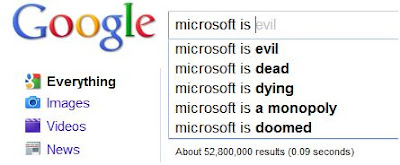I detest the inhabitants of web2.0. Web2.0 is supposed to be this great empowering phenomenon that allows people to interact and have their say and so on and so forth. While I don't in anyway deny that it's generated loads of quality and easily accessible information, it's generated a hundred times more of the worthless kind. And the power to say what we want is so often the power to mindlessly say things that hurt and demean people.
Right and wrong will always be relative.
A plethora of opinions will always exist.
We will always want to be "right"; we're human.
But we seem so sure that we're right. And anybody who disagrees with what we think suddenly becomes such a target in this hyper-connected world. It makes me think that we're all just as bad as Machiavellian philosophy suggests we are. It's a modern day "Lord of the Flies" if you will.
Someone whom I crossed paths with last year expressed a view on a blog. Many people commented. Some liked it and some hated it; nothing wrong with that. But then the people that hated it didn't say that they disagreed with this person's opinion because of reason a, reason b and reason c. They said that this person was wrong, that this person essentially sucked (although in more colorful language and in more creative and hurtful ways) and so on and so forth. It's perplexing to me how we treat racist comments and such so seriously and try to promote racial tolerance. Yet we lack basic tolerance for diversity of opinion, a fact that web2.0 accentuates in such a prominent and deeply disturbing way. I wonder if the people that wrote all of those things ever stopped to think what it would be like if people disagreed with their opinion and walked up to them, insulted them and walked away. That's essentially what they did to somebody else, just that they did it in the virtual world. That's why I detest the inhabitants of web2.0; a large portion are almost not human.
Just as I got to the point where I thought Machiavelli was completely right, I saw a post on facebook. This time it was written by someone whom I'd crossed paths with way back in 2008 and not spoken to after. I learned that he has cancer. He'd been through a few tests off late and his doctors told him that he wouldn't need a bone marrow transplant; he just needed to continue with his chemo. Good news for him obviously. Under there there were 166 likes, including some from those of us who'd met for a week years back, and a couple dozen comments wishing him love and luck. If I were him the simple microsecond people took to click "Like" would mean a lot to me.
The internet and social networking allow for this great global support system. That to me is the one saving grace of the inhabitants of the web2.0 world. Maybe the internet and hiding behind screens doesn't always bring out the worst in us. I wish it brought out the good parts more often though.



